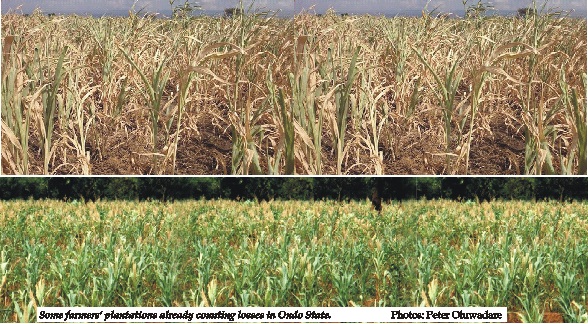What is the penalty for lying under oath?
By Bamidele kolawole
|
Lying under an oath is known as perjury or for swearing in some climes and it is the intentional act of swearing a false oath or falsifying an affirmation to tell the truth, whether spoken or in writing, concerning matters material to an official proceeding.

Lying under oath or any other Authority Sanctioned by Law is an offense known as perjury, defined in section 117 and punishable under section 118 of the criminal code by either 14 years imprisonment or for life if it is done to implicate someone for an offense punishable by Death/life imprisonment.
The lie could be either oral or documented (e.g. affidavit), during a Court proceeding or towards initiating a Court proceeding.
It is an offense because the Fact or Information purportedly deposed to is believed and expected to be within the unmistakable knowledge of the deponent, hence the court or the relevant authority can safely rely on it without the miscarriage of justice.

The act of lying under oath is called perjury in most jurisdictions, although it can also be referred to as forswearing or lying on oath.
In legal terms, it requires an intentional act of lying after a person has taken an oath or affirmation, to tell the truth. Penalties for this crime can vary by jurisdiction but often include imprisonment.
Perjury is a crime in many jurisdictions. A person can commit perjury by lying under oath either verbally or in writing.
Although the possible punishment for this crime can vary, under the laws of many countries, it is considered serious and therefore carries a possible prison sentence if a person is convicted.

Before delving into the penalty for lying under oath, there is the need to establish some facts. The offense of lying under oath, which is otherwise known as perjury is an act wherein a person, either being under oath in a court, or an affidavit gives false information.
Similarly, it is further established that any person who, in any judicial proceeding, or to institute any judicial proceeding, knowingly gives false testimony touching any matter which is material to any question then depending in that proceeding, or intended to be raised in that proceeding, is guilty of an offense, which is called perjury.
Considering the aforesaid, there is the need to state that whilst Section 117 of the Criminal Code Act defines Perjury, Section 118 prescribes the punishment for the act where it stating that any person who commits perjury is liable to imprisonment for 14 years.
Similarly, If the offender commits the offense to procure the conviction of another person for an offense punishable by death or with imprisonment for life he is liable to imprisonment for life.
In Ondo State under the Criminal Law of Ondo State, particularly Section 118 of the Criminal Code, Laws of Ondo State, the offense is punishable.

It is perjury which is punishable under the law. Sections 117 and 118 of the criminal code and sections 156 and 158 of the penal code make it punishable with 7 to 14 years imprisonment.

When lying under oaths, is an offence called perjury, perjury is considered a crime against justice, since lying under oath compromises the authority of the court.
Perjury is a very serious crime against integrity of the justice system.
States and federal penalties for perjury includes fines and or imprisonment for up to 5 years or both.
In short penalties for the offence of perjury varies from one jurisdiction to another.

Lying on oath, we call it perjury. When you lie on oath and it is found out that what you said or your vermin’s in that oath are not correct and it was deliberate, we call it perjury. So, if you are found to be guilty of perjury, you may be liable for imprisonment for 14 years.
It depends. If you lie on oath by indicting somebody of a type of crime that is punishable by death, you will be liable for imprisonment for life. So, those are the two categories of penalties for committing perjury.
No matter how high that person is in the society, if somebody lies under oath, that person has committed perjury and the punishment is imprisonment for 14 years or life imprisonment. The law is no respecter of anybody.”

It is called Perjury i.e telling lies under oath.
Section 118 of the Criminal Code reads: Any person who commits perjury is liable to imprisonment for 14 years. If the offender commits the offence in order to procure the conviction of another person for an offence punishable with death or with imprisonment for life, he is liable to imprisonment for life.

Lying in court probably to mislead the court is an act known as perjury and it is a criminal offence. The court does not look kindly with anyone who lies before it, misleading the court or given fabricated stories just to pervert justice is an offence and the court cannot overlook it if discovers at the end of it.
Perjury according to Black’s Law Dictionary is defined as the act or an instance of a person’s deliberately making material false or misleading statements while on oath – Also termed false swearing; false oath.
Essentially, it is important that when anyone is given evidence under oath, he/she says whatever he/ she knows about the case rather than fabricating lies, even a lawyer who lies simply to save his client, acts unprofessionally and can be liable if found guilty, because nobody is above the law.
Sometimes last year, the Ikeja Special Offences Court of Lagos State sentenced a lawyer, Kenneth Ajoku, to seven years imprisonment with an option of fine for the offences of perjury and fabrication of evidence.
Section 117 of the Criminal Code Act in Nigeria. Perjury
Any person who, in any judicial proceeding, or for the purpose of instituting any judicial proceeding, knowingly gives false testimony touching any matter which is material to any question then pending in that proceedings, or intended to be raised in that proceeding, is guilty of an offence which is called perjury.
It is immaterial whether the testimony is given on oath or under any other sanction authorised by law.
The forms and ceremonies used in administering the oath or in otherwise binding the person giving the testimony to speak the truth are immaterial, if he assent to the forms and ceremonies actually used.
It is immaterial whether the false testimony is given orally or in writing.
It is immaterial whether the court or tribunal is properly constituted, or is held in the proper place, or not, if it actually acts as a court or tribunal in the proceeding in which the testimony is given.
It is immaterial whether the person who gives the testimony is a competent witness or not, or whether the testimony is admissible in the proceeding or not.
The offender cannot be arrested without warrant.
While Section 118 of the Criminal Code provides the Punishment for perjury: Any person who commits perjury is liable to imprisonment for fourteen years.
If the offender commits the offence in order to procure the conviction of another person for an offence punishable with death or with imprisonment for life, he is liable to imprisonment for life.

Lying under oath is an offense punishable under Nigeria’s legal system. This offense is referred to as perjury in Nigerian law.
Section 117 of the Criminal Code Act Cap C 38 defines as follows:
Any person who, in any judicial proceeding, or to institute any judicial proceeding, knowingly gives false testimony touching any matter which is material to any question then pending in that proceeding, or intended to be raised in that proceeding, is guilty of an offense, which is called perjury.
Section 118 provides that “any person who commits perjury is liable to imprisonment for 14 years.
If the offender commits the offense to procure the conviction of another person for an offense punishable by death or with imprisonment for life, he is liable to imprisonment for life.
Therefore, going by the sections cited above, lying under oath is called perjury and it is punishable under Nigerian law.

Lying under an Oath is known as Perjury or foreswearing in some climes and it is the intentional act of swearing a false oath or falsifying an affirmation to tell the truth, whether spoken or in writing, concerning matters material to an official proceeding.
Like most other crimes in the common law system, to be convicted of perjury one must have had the intention (mens rea) to commit the act and to have actually committed the act (actus reus).
Further, statements that are facts cannot be considered perjury, even if they might arguably constitute an omission, and it is not perjury to lie about matters that are immaterial to the legal proceeding.
Statements that entail an interpretation of fact are not perjury because people often draw inaccurate conclusions unwittingly or make honest mistakes without the intent to deceive.
Individuals may have honest but mistaken beliefs about certain facts or their recollection may be inaccurate, or may have a different perception of what is the accurate way to state the truth.
In some jurisdictions outside Nigeria, no crime has occurred when a false statement is (intentionally or unintentionally) made while under oath or subject to penalty.
Instead, criminal culpability attaches only at the instant the declarant falsely asserts the truth of statements (made or to be made) that are material to the outcome of the proceeding.
It is not perjury, for example, to lie about one’s age except if age is a fact material to influencing the legal result, such as eligibility for old age retirement benefits or whether a person was of an age to have legal capacity.

Perjury is considered a serious offense, as it can be used to usurp the power of the courts, resulting in miscarriages of justice.
The offence of perjury is created by section 117 of the Criminal Code which is applicable in the southern and western parts of Nigeria and it reads:
Any person who, in any judicial proceeding, or for the purpose of instituting any judicial proceeding, knowingly gives false testimony touching any matter which is material to any question then depending in that proceeding, or intended to be raised in that proceeding, is guilty of an offence, which is called perjury.
It is immaterial whether the testimony is given on oath or under any other sanction authorized by law.
The forms and ceremonies used in administering the oath or in otherwise binding the person giving the testimony to speak the truth are immaterial, if he assent to the forms and ceremonies actually used.
It is immaterial whether the false testimony is given orally or in writing. It is immaterial whether the court or tribunal is properly constituted, or is held in the proper place, or not, if it actually acts as a court or tribunal in the proceeding in which the testimony is given.
It is immaterial whether the person who gives the testimony is a competent witness or not, or whether the testimony is admissible in the proceeding or not.
Section 118 of the Criminal Code provides for the punishment available to a person who has committed the offence of perjury and it reads:
Any person who commits perjury is liable to imprisonment for 14 years. If the offender commits the offence in order to procure the conviction of another person for an offence punishable with death or with imprisonment for life, he is liable to imprisonment for life
The offender cannot be arrested without warrant and he or she cannot be convicted on a testimony of one witness. The evidence against such person must be corroborated by another person by virtue of the provision of Section 119 of the Criminal Code.
Conclusively, perjury means that a person has proved false to the oath he has taken and upon conviction, such person is liable to an imprisonment for 14 years and where the perjury has led to the imprisonment of a person for life or death, he is liable to imprisonment for life as well.
Perjury is one of the most serious offence in Nigeria. It is a crime of lying in court or insinuating a point for the purpose of an ongoing proceeding or likely to happen in the future. It may be in oral or written form.
Once it relates to any judicial siting for the purpose of doing justice to a proceeding before it, any information given in that proceeding as evidence for the purpose of truncating justice is called perjury. It does not matter whether the court is constituted or not. The definition of perjury can be found under section 117 of the criminal code act 1990 which we call LFN 2004 now.
Whether you write or say it, whatever you have said in other to alter the just cause of a legal proceeding is perjury.
The punishment can be found under section 118 of the criminal code act and it is divided into two. If the accused or defendant is not liable to be sentenced to life imprisonment or death, the person who commits perjury is liable upon conviction to 14 years imprisonment.
If the evidence given is for the purpose of conviction such that the defendant may be sentenced to death or to life imprisonment, the person who gave that evidence will be sentenced to life imprisonment.
That is how serious that offence is. How you swear an oath does not matter, all you just need to do is to make a statement that can change the course of justice either to pervert the judgement of the afflicted or to set a criminal free from the hands of the law.”










